大学英语二级期末考试 阅读理解命题范围
- 格式:doc
- 大小:156.50 KB
- 文档页数:14
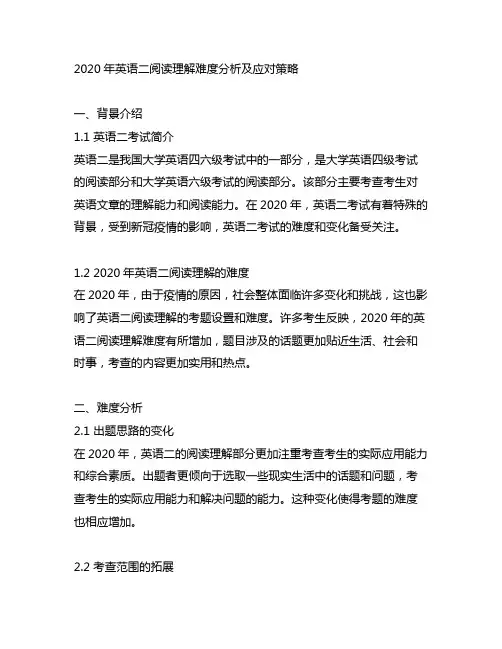
2020年英语二阅读理解难度分析及应对策略一、背景介绍1.1 英语二考试简介英语二是我国大学英语四六级考试中的一部分,是大学英语四级考试的阅读部分和大学英语六级考试的阅读部分。
该部分主要考查考生对英语文章的理解能力和阅读能力。
在2020年,英语二考试有着特殊的背景,受到新冠疫情的影响,英语二考试的难度和变化备受关注。
1.2 2020年英语二阅读理解的难度在2020年,由于疫情的原因,社会整体面临许多变化和挑战,这也影响了英语二阅读理解的考题设置和难度。
许多考生反映,2020年的英语二阅读理解难度有所增加,题目涉及的话题更加贴近生活、社会和时事,考查的内容更加实用和热点。
二、难度分析2.1 出题思路的变化在2020年,英语二的阅读理解部分更加注重考查考生的实际应用能力和综合素质。
出题者更倾向于选取一些现实生活中的话题和问题,考查考生的实际应用能力和解决问题的能力。
这种变化使得考题的难度也相应增加。
2.2 考查范围的拓展2020年英语二阅读理解的考题也更加注重考生的综合素质和社会责任感。
题目涉及的内容更加广泛,可能涉及到政治、经济、环保、科技等多个领域,对考生的知识面和理解能力提出了更高的要求。
三、应对策略3.1 提前了解考试大纲在备考英语二阅读理解时,考生要提前了解考试大纲,了解考试的命题思路和内容涉及范围,抓住考点,有的放矢地进行备考。
也可以从大纲中获得一些宝贵的备考提示和建议。
3.2 多方位积累阅读素材在备考阅读理解时,考生要多方位积累阅读素材,包括但不限于报纸、杂志、网络文章等。
要关注社会热点、时事新闻等,扩大自己的知识面和阅读广度,为考试中遇到的话题做好准备。
3.3 注重阅读方法和技巧在备考阅读理解时,考生要注重阅读方法和技巧的训练。
要提高自己的阅读速度和理解能力,培养抓住重点信息的能力,善于捕捉文章的主题思想和核心观点,这样有利于在有限的时间内更好地完成阅读理解题目。
3.4 多做模拟题和真题在备考阅读理解时,多做相关的模拟题和真题是非常重要的。
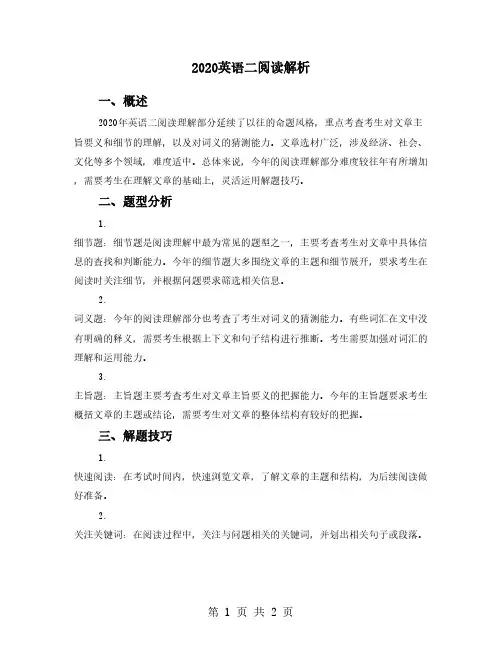
2020英语二阅读解析一、概述2020年英语二阅读理解部分延续了以往的命题风格,重点考查考生对文章主旨要义和细节的理解,以及对词义的猜测能力。
文章选材广泛,涉及经济、社会、文化等多个领域,难度适中。
总体来说,今年的阅读理解部分难度较往年有所增加,需要考生在理解文章的基础上,灵活运用解题技巧。
二、题型分析1.细节题:细节题是阅读理解中最为常见的题型之一,主要考查考生对文章中具体信息的查找和判断能力。
今年的细节题大多围绕文章的主题和细节展开,要求考生在阅读时关注细节,并根据问题要求筛选相关信息。
2.词义题:今年的阅读理解部分也考查了考生对词义的猜测能力。
有些词汇在文中没有明确的释义,需要考生根据上下文和句子结构进行推断。
考生需要加强对词汇的理解和运用能力。
3.主旨题:主旨题主要考查考生对文章主旨要义的把握能力。
今年的主旨题要求考生概括文章的主题或结论,需要考生对文章的整体结构有较好的把握。
三、解题技巧1.快速阅读:在考试时间内,快速浏览文章,了解文章的主题和结构,为后续阅读做好准备。
2.关注关键词:在阅读过程中,关注与问题相关的关键词,并划出相关句子或段落。
3.归纳推理:在回答主旨题时,需要把握文章的整体结构,根据关键词进行归纳推理,得出正确的答案。
4.排除法:对于一些难以确定的答案,可以采用排除法,排除明显错误的选项,缩小选择范围。
四、试题解析以一道细节题为例,题目要求找出与“The pandemic has brought about significant changes in the way welive”相符合的句子。
在文章中找到与此相关的句子为:“The outbreak has accelerated the shift towards a digital age, with many people now relying on technology to communicate and accessinformation.”这个句子清楚地说明了疫情对生活方式的影响,因此答案为“The pandemic has brought about significant changes in the way we live”。
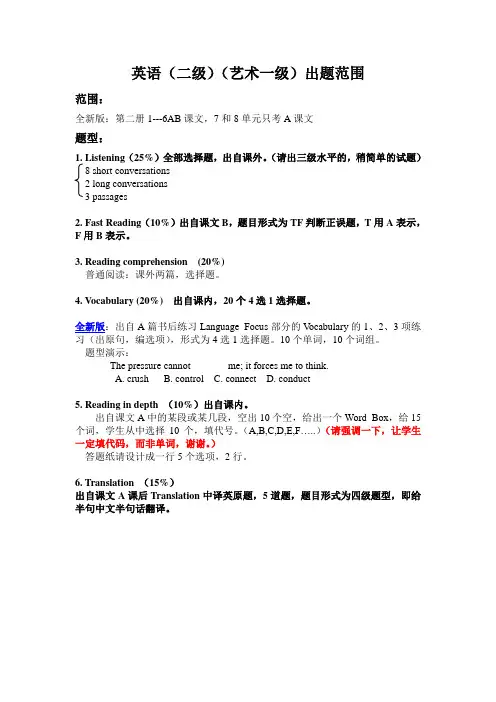
英语(二级)(艺术一级)出题范围
范围:
全新版:第二册1---6AB课文,7和8单元只考A课文
题型:
1. Listening(25%)全部选择题,出自课外。
(请出三级水平的,稍简单的试题)8 short conversations
2 long conversations
3 passages
2. Fast Reading(10%)出自课文B,题目形式为TF判断正误题,T用A表示,F用B表示。
3. Reading comprehension (20%)
普通阅读:课外两篇,选择题。
4. Vocabulary (20%) 出自课内,20个4选1选择题。
全新版:出自A篇书后练习Language Focus部分的V ocabulary的1、2、3项练习(出原句,编选项),形式为4选1选择题。
10个单词,10个词组。
题型演示:
The pressure cannot_______ me; it forces me to think.
A. crush
B. control
C. connect
D. conduct
5. Reading in depth (10%)出自课内。
出自课文A中的某段或某几段,空出10个空,给出一个Word Box,给15个词,学生从中选择10个,填代号。
(A,B,C,D,E,F…..)(请强调一下,让学生一定填代码,而非单词,谢谢。
)
答题纸请设计成一行5个选项,2行。
6. Translation (15%)
出自课文A课后Translation中译英原题,5道题,题目形式为四级题型,即给半句中文半句话翻译。
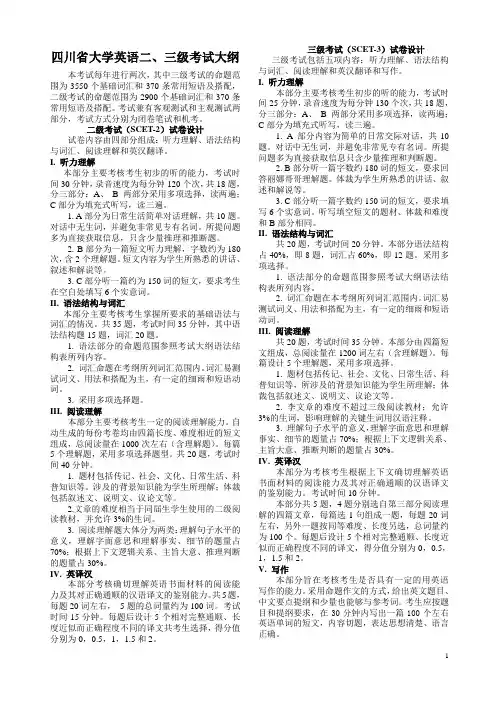
四川省大学英语二、三级考试大纲本考试每年进行两次,其中三级考试的命题范围为3550个基础词汇和370条常用短语及搭配,二级考试的命题范围为2900个基础词汇和370条常用短语及搭配。
考试兼有客观测试和主观测试两部分,考试方式分别为闭卷笔试和机考。
二级考试(SCET-2)试卷设计试卷内容由四部分组成:听力理解、语法结构与词汇、阅读理解和英汉翻译。
I. 听力理解本部分主要考核考生初步的听的能力,考试时间30分钟,录音速度为每分钟120个次,共18题,分三部分:A、B 两部分采用多项选择,读两遍;C部分为填充式听写,读三遍。
1. A部分为日常生活简单对话理解,共10题。
对话中无生词,并避免非常见专有名词。
所提问题多为直接获取信息,只含少量推理和推断题。
2. B部分为一篇短文听力理解,字数约为180次,含2个理解题。
短文内容为学生所熟悉的讲话、叙述和解说等。
3. C部分听一篇约为150词的短文,要求考生在空白处填写6个实意词。
II. 语法结构与词汇本部分主要考核考生掌握所要求的基础语法与词汇的情况。
共35题,考试时间35分钟,其中语法结构题15题,词汇20题。
1. 语法部分的命题范围参照考试大纲语法结构表所列内容。
2. 词汇命题在考纲所列词汇范围内。
词汇易测试词义、用法和搭配为主,有一定的细雨和短语动词。
3. 采用多项选择题。
III. 阅读理解本部分主要考核考生一定的阅读理解能力。
自动生成的每份考卷均由四篇长度、难度相近的短文组成,总阅读量在1000次左右(含理解题)。
每篇5个理解题,采用多项选择题型。
共20题,考试时间40分钟。
1. 题材包括传记、社会、文化、日常生活、科普知识等。
涉及的背景知识能为学生所理解;体裁包括叙述文、说明文、议论文等。
2.文章的难度相当于同届生学生使用的二级阅读教材,并允许3%的生词。
3. 阅读理解题大体分为两类:理解句子水平的意义,理解字面意思和理解事实、细节的题量占70%;根据上下文逻辑关系、主旨大意、推理判断的题量占30%。
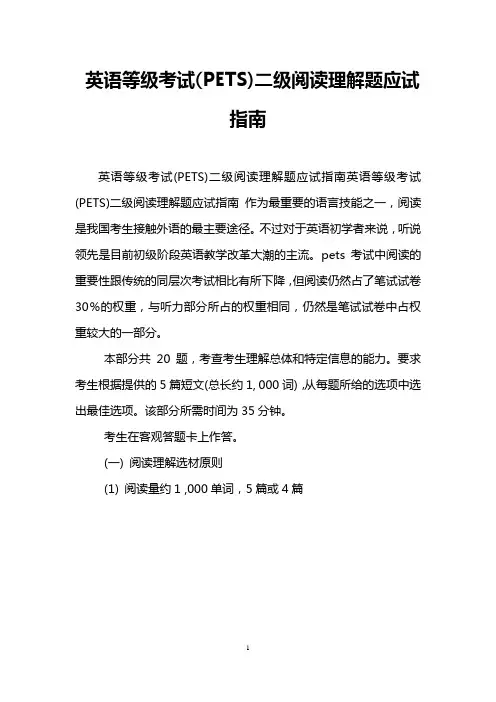
英语等级考试(PETS)二级阅读理解题应试
指南
英语等级考试(PETS)二级阅读理解题应试指南英语等级考试(PETS)二级阅读理解题应试指南作为最重要的语言技能之一,阅读是我国考生接触外语的最主要途径。
不过对于英语初学者来说,听说领先是目前初级阶段英语教学改革大潮的主流。
pets考试中阅读的重要性跟传统的同层次考试相比有所下降,但阅读仍然占了笔试试卷30%的权重,与听力部分所占的权重相同,仍然是笔试试卷中占权重较大的一部分。
本部分共20题,考查考生理解总体和特定信息的能力。
要求考生根据提供的5篇短文(总长约1, 000词),从每题所给的选项中选出最佳选项。
该部分所需时间为35分钟。
考生在客观答题卡上作答。
(一) 阅读理解选材原则
(1) 阅读量约1 ,000单词,5篇或4篇
1。

2019年英语二第四篇阅读难度随着我国经济不断发展,越来越多的人意识到英语的重要性。
英语作为一门国际通用语言,在全球范围内具有重要的地位。
许多人都认为学好英语对自己的职业发展和未来的发展都非常重要。
而对于很多人来说,英语二考试是他们进一步学习或工作的一个门槛。
这也就意味着2019年英语二第四篇阅读难度的重要性不言而喻。
接下来,我们将从以下几个方面来讨论2019年英语二第四篇阅读难度的题目内容,难度评定和备考策略。
一、文章内容在2019年英语二第四篇阅读难度中,文章内容大多为社会热点话题,包括但不限于环保、教育、健康等方面的内容。
为了让考生更好地理解和分析文章,这些文章内容多从实际生活中提炼,具体而微,贴近考生的生活。
二、题目难度评定2019年英语二第四篇阅读难度的题目难度相对较大。
因为文章内容涉及到社会热点话题,其中有一些专业术语或者是具体数据需要考生在有限的时间内迅速理解和把握。
而且在文章阅读的过程中还需要考生对文章的逻辑结构和段落间的关联性进行综合分析,这对考生的英语综合能力有较高的要求。
三、备考策略针对2019年英语二第四篇阅读难度的高难度特点,考生们在备考时可以采取以下策略:1. 注重平时的积累。
英语语言的学习是一个积累的过程,考生们需要在日常生活中多阅读英文报刊、杂志,多听英语广播,多看英语电影,这些都能为考生积累词汇和习惯英语阅读。
2. 注重整体把握。
在考试时,考生在进行文章阅读时,不应该只注重对文章中每一个细节的理解,而应该注重文章的整体把握,对文章的中心思想进行概括和总结。
3. 注重语言细节。
在备考时,考生们需要注意英语的语法和词汇的用法。
因为在文章阅读过程中,理解和把握具体的语言细节对于考生分析文章的逻辑结构和作者的态度都有很大的帮助。
4. 注重模拟训练。
在备考过程中,要注重模拟训练。
每天进行一两篇模拟题的练习,并时刻注意查漏补缺,分析并总结错题的原因和规律。
通过以上几点备考策略的合理运用,相信考生们在2019年英语二第四篇阅读难度的考试中一定能取得理想的成绩。
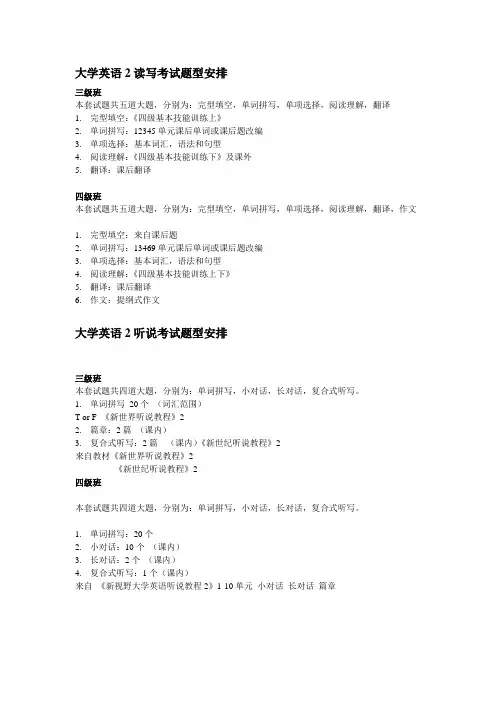
大学英语2读写考试题型安排三级班本套试题共五道大题,分别为:完型填空,单词拼写,单项选择,阅读理解,翻译1.完型填空:《四级基本技能训练上》2.单词拼写:12345单元课后单词或课后题改编3.单项选择:基本词汇,语法和句型4.阅读理解:《四级基本技能训练下》及课外5.翻译:课后翻译四级班本套试题共五道大题,分别为:完型填空,单词拼写,单项选择,阅读理解,翻译,作文1.完型填空:来自课后题2.单词拼写:13469单元课后单词或课后题改编3.单项选择:基本词汇,语法和句型4.阅读理解:《四级基本技能训练上下》5.翻译:课后翻译6.作文:提纲式作文大学英语2听说考试题型安排三级班本套试题共四道大题,分别为:单词拼写,小对话,长对话,复合式听写。
1.单词拼写20个(词汇范围)T or F 《新世界听说教程》22.篇章:2篇(课内)3.复合式听写:2篇(课内)《新世纪听说教程》2来自教材《新世界听说教程》2《新世纪听说教程》2四级班本套试题共四道大题,分别为:单词拼写,小对话,长对话,复合式听写。
1.单词拼写:20个2.小对话:10个(课内)3.长对话:2个(课内)4.复合式听写:1个(课内)来自《新视野大学英语听说教程2》1-10单元小对话长对话篇章2011—2012学年第二学期期末考试三级班听力词库1. supervisor n. 监督员,指导者2. acquaintance n. 熟人,相识,了解3. colleague n. 同事4. nosy a. 好管闲事的,爱追问的5. keepsake n. 纪念品6. label n. 标签,商标;v. 贴标签于7. academic a. 学术的,学院的8. category n. 种类,分类9. supportive a. 支持的,支援的10. nervous a. 紧张的11. embarrassed a. 难为情的,尴尬的12. scared a. 害怕的,惊吓的13. stressed a. 紧张的,感到有压力的14. bow v. /n. 鞠躬,弯腰15. healthy a. 健康的16. spicy a. 辛辣的,多香料的17. nutritious a. 有营养的,滋养的18. tasty a.美味可口的19. bitter a. 苦的,痛苦的20. delicious a. 美味的,可口的21. aging n. 老化,陈化22. convenient a. 方便的,便利的23. percent n. 百分比,百分率24. disagree v. 不同意,不一致25. definitely ad. 当然,明确地26. absolutely ad. 绝对地,完全地27. complain v. 抱怨,投诉28. respect v./n. 尊敬,尊重29. appearance n. 外貌,出现30. fashion n. 时尚,时装31. stylish a. 时髦的,式样新颖的32. commit v. 犯罪,做错事;使承担义务32. confession n. 告白,承认33. imaginary a. 想象的,假想的34. intelligent a. 智能的,聪明的35. vanish v. 消失36. finance n. 金融,财务37. seatbelt n. 安全带38. impress v. 给…以深刻印象39. superficial a. 表面的,肤浅的40. personality n. 个性,性格41. conscious a. 意识到的,神志清醒的42. professional a. 职业的43. conservative a. 保守的44. potential a. 潜在的,可能的45. passion n. 热情,酷爱46. annual a. 每年的47. seek v. 寻求,探索48. impact v/n. 影响49. incredible a. 难以置信的50. thoughtful a. 思虑周详的,体贴的51. impressive a. 印象深刻的52. sightseeing n. 观光,旅游53. volunteer n/v. 志愿者,志愿54. offer v/n. 主动提供,55. presentation n.展示56. vacation n. 假期,休假57. nightclub n. 夜总会58. active a. 活跃的,主动地59. unique a. 独一无二的60. historical a. 历史的61. adventure n. 冒险62. physical a. 身体的,物质的63. activity n. 活动64. register v. 登记,注册65. expert n. 专家66. location n. 位置67. destination n. 目的地,终点68. normal a. 正常的69. benefit n/v. 收益,获得好处,70. abandon v. 抛弃,舍弃71. upset a. 难过的,使烦躁72. invite v. 邀请73. criticize v. 指责,批评74. mess n/v. 混乱,乱七八糟75. romantic a. 浪漫的76. conflict n. 冲突,矛盾77. interview n/v. 采访,面试78. research n. 研究79. interaction n. 互动,交流80. emotional a. 情绪的,情感的81. overcome v. 克服82. pursuit n. 追求83. loneliness n. 孤单,孤独84. attractive a. 吸引的,有吸引力的85. shift n. 班次,轮班86. appointment n. 预约,约会87. customer n. 顾客,客户88. apologize v. 道歉89. convenience n. 方便,便利90. chase v. 追赶,追求91. collection n. 收集,收藏92. afford v. 买得起,负担得起93. priority n.优先权,优先考虑的事情94. persuade v. 说服95. celebrate v. 庆祝96.obvious a. 明白的,明显的97. extreme a. 极限的,极端的98. scary a. 恐怖的,害怕的99. common a. 共同的,普遍的100. crash v. 冲撞、撞击四级班听力词库1. charge2. convention3. efficient4. obtain5. competent6.consequently7. fulfill8. conducting9. consequently10. significancemitment12. attraction13. appointment14.impression15. civilizationposition17.confusion18.congratulation19.consideration20.explanation21. acquisition22.depression23.advisable 24.disirable25.favorable26. contribution27. remarkable28.preferable29.drinkable30.acceptable31mutual32.illusion33.canceled34.overlooked35.proceeded36.resolve37.prejudicepromise39.confirm40.subsequently41.forbid42.identical43.objectino44.warmth45.volunteer46.overseas47.decline48.resist49.fancy50.decrease51confess52. reserve53. professional54. impressive55. latter56. convey57. qualify58. refined59. substitute60. approval61.illegal62.incapable63.irregular64.inappropriate65.inconsistent66. incorrect67.indefinite68.removal69.equivalent70.deceived71.guarantee72. depressed73.abnormalmon75.accomplish76.immigrant77.swear78.persist79.diagnosepetitive81.defeat82.destiny83.figure out84.significant85.responsibility86.elegant87.influence88.superficial89. approve90. impressive91. unique92. estimate93.identify94.reflect95.religious96.nonsense97.credit98.sitcom99.disrespect 100. objection 101.objection 102.resistance 103.cancel 104.reservation 105.definitely 106. compatible 107.romantic 108.private 109.spiritualbat111.occasionally112.delight113.engage114. identical115.charming116.criticize117.conference118.expect119.culture120.tough121.similar to122.divorce123.suspect124.conscious125.relaxed126.tradition127.appreciate128.irritate129.checkup130.accent131.invite132.entitle133. abruptly134.efficient135.experience136.in particular137. inefficiency138.decrease139. previous140.dishonest141.discouraged142. discontinued143. discharged144.disclosed145.brotherhood146. citizenship147.anticipate148.birlliantpelled150.innocent152. accomplish153.. deny154. reservations155. relationship156 obtain157 prejudice;。
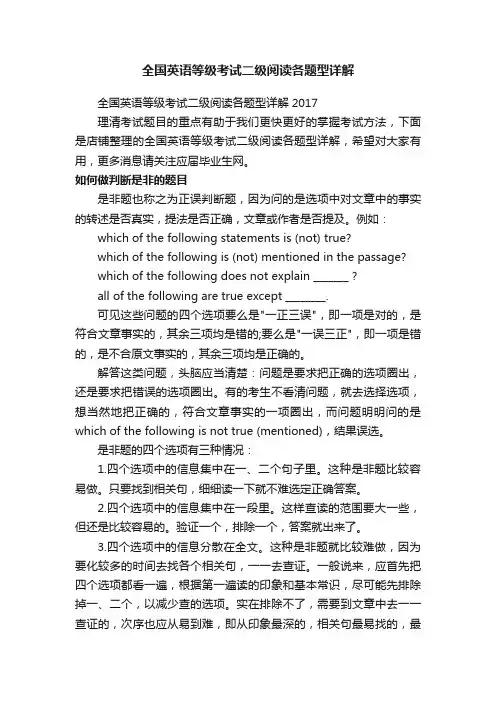
全国英语等级考试二级阅读各题型详解全国英语等级考试二级阅读各题型详解2017理清考试题目的重点有助于我们更快更好的掌握考试方法,下面是店铺整理的全国英语等级考试二级阅读各题型详解,希望对大家有用,更多消息请关注应届毕业生网。
如何做判断是非的题目是非题也称之为正误判断题,因为问的是选项中对文章中的事实的转述是否真实,提法是否正确,文章或作者是否提及。
例如:which of the following statements is (not) true?which of the following is (not) mentioned in the passage?which of the following does not explain _______ ?all of the following are true except ________.可见这些问题的四个选项要么是"一正三误",即一项是对的,是符合文章事实的,其余三项均是错的;要么是"一误三正",即一项是错的,是不合原文事实的,其余三项均是正确的。
解答这类问题,头脑应当清楚:问题是要求把正确的选项圈出,还是要求把错误的选项圈出。
有的考生不看清问题,就去选择选项,想当然地把正确的,符合文章事实的一项圈出,而问题明明问的是which of the following is not true (mentioned),结果误选。
是非题的四个选项有三种情况:1.四个选项中的信息集中在一、二个句子里。
这种是非题比较容易做。
只要找到相关句,细细读一下就不难选定正确答案。
2.四个选项中的信息集中在一段里。
这样查读的范围要大一些,但还是比较容易的。
验证一个,排除一个,答案就出来了。
3.四个选项中的信息分散在全文。
这种是非题就比较难做,因为要化较多的时间去找各个相关句,一一去查证。
一般说来,应首先把四个选项都看一遍,根据第一遍读的印象和基本常识,尽可能先排除掉一、二个,以减少查的选项。
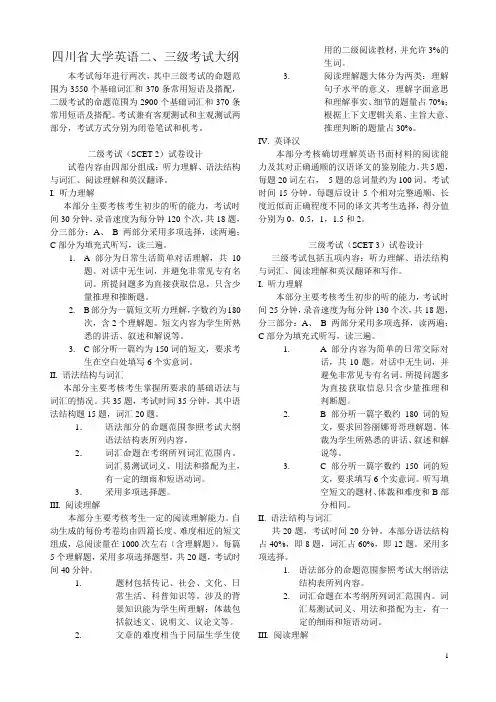
四川省大学英语二、三级考试大纲本考试每年进行两次,其中三级考试的命题范围为3550个基础词汇和370条常用短语及搭配,二级考试的命题范围为2900个基础词汇和370条常用短语及搭配。
考试兼有客观测试和主观测试两部分,考试方式分别为闭卷笔试和机考。
二级考试(SCET-2)试卷设计试卷内容由四部分组成:听力理解、语法结构与词汇、阅读理解和英汉翻译。
I. 听力理解本部分主要考核考生初步的听的能力,考试时间30分钟,录音速度为每分钟120个次,共18题,分三部分:A、B 两部分采用多项选择,读两遍;C部分为填充式听写,读三遍。
1.A部分为日常生活简单对话理解,共10题。
对话中无生词,并避免非常见专有名词。
所提问题多为直接获取信息,只含少量推理和推断题。
2.B部分为一篇短文听力理解,字数约为180次,含2个理解题。
短文内容为学生所熟悉的讲话、叙述和解说等。
3.C部分听一篇约为150词的短文,要求考生在空白处填写6个实意词。
II. 语法结构与词汇本部分主要考核考生掌握所要求的基础语法与词汇的情况。
共35题,考试时间35分钟,其中语法结构题15题,词汇20题。
1.语法部分的命题范围参照考试大纲语法结构表所列内容。
2.词汇命题在考纲所列词汇范围内。
词汇易测试词义、用法和搭配为主,有一定的细雨和短语动词。
3.采用多项选择题。
III. 阅读理解本部分主要考核考生一定的阅读理解能力。
自动生成的每份考卷均由四篇长度、难度相近的短文组成,总阅读量在1000次左右(含理解题)。
每篇5个理解题,采用多项选择题型。
共20题,考试时间40分钟。
1.题材包括传记、社会、文化、日常生活、科普知识等。
涉及的背景知识能为学生所理解;体裁包括叙述文、说明文、议论文等。
2.文章的难度相当于同届生学生使用的二级阅读教材,并允许3%的生词。
3.阅读理解题大体分为两类:理解句子水平的意义,理解字面意思和理解事实、细节的题量占70%;根据上下文逻辑关系、主旨大意、推理判断的题量占30%。
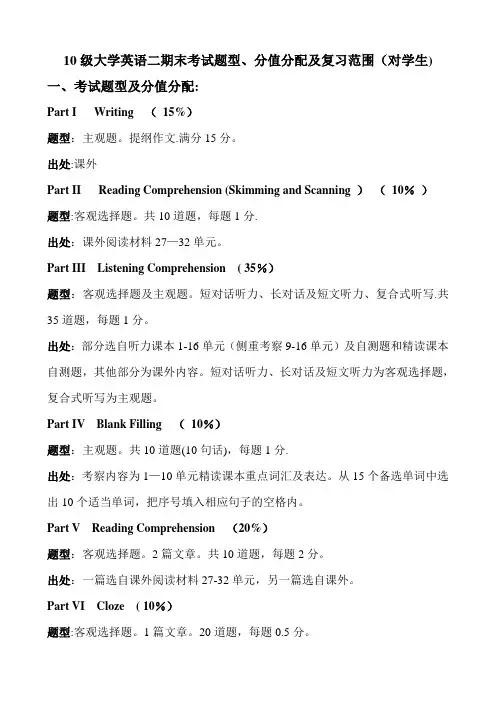
10级大学英语二期末考试题型、分值分配及复习范围(对学生) 一、考试题型及分值分配:
Part I Writing (15%)
题型:主观题。
提纲作文.满分15分。
出处:课外
Part II Reading Comprehension (Skimming and Scanning )(10%)
题型:客观选择题。
共10道题,每题1分.
出处:课外阅读材料27—32单元。
Part III Listening Comprehension ( 35%)
题型:客观选择题及主观题。
短对话听力、长对话及短文听力、复合式听写.共35道题,每题1分。
出处:部分选自听力课本1-16单元(侧重考察9-16单元)及自测题和精读课本自测题,其他部分为课外内容。
短对话听力、长对话及短文听力为客观选择题,复合式听写为主观题。
Part IV Blank Filling (10%)
题型:主观题。
共10道题(10句话),每题1分.
出处:考察内容为1—10单元精读课本重点词汇及表达。
从15个备选单词中选出10个适当单词,把序号填入相应句子的空格内。
Part V Reading Comprehension (20%)
题型:客观选择题。
2篇文章。
共10道题,每题2分。
出处:一篇选自课外阅读材料27-32单元,另一篇选自课外。
Part VI Cloze ( 10%)
题型:客观选择题。
1篇文章。
20道题,每题0.5分。
出处:根据1—10单元课文内容或课后练习改编。
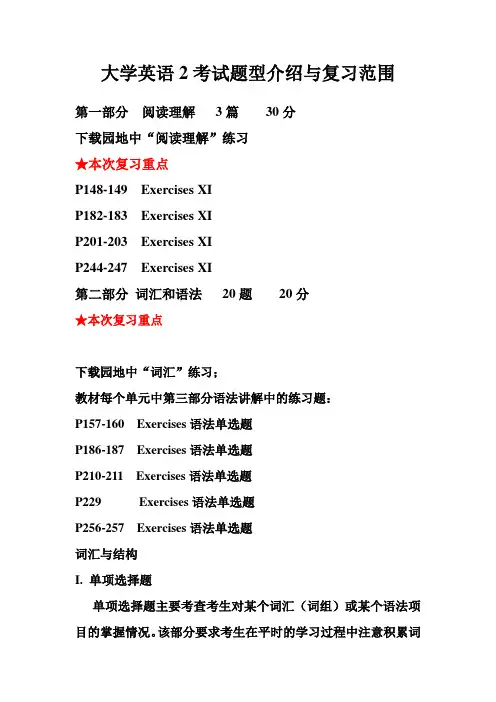
大学英语2考试题型介绍与复习范围第一部分阅读理解3篇30分下载园地中“阅读理解”练习★本次复习重点P148-149 Exercises XIP182-183 Exercises XIP201-203 Exercises XIP244-247 Exercises XI第二部分词汇和语法20题20分★本次复习重点下载园地中“词汇”练习;教材每个单元中第三部分语法讲解中的练习题:P157-160 Exercises语法单选题P186-187 Exercises语法单选题P210-211 Exercises语法单选题P229 Exercises语法单选题P256-257 Exercises语法单选题词汇与结构I. 单项选择题单项选择题主要考查考生对某个词汇(词组)或某个语法项目的掌握情况。
该部分要求考生在平时的学习过程中注意积累词汇及其常用含义、常见(固定)搭配、近义词(反义词)和惯用表达方式等;同时注意强化对基本语法结构的掌握。
在做题的过程中,首先要弄清考题的重点,并通过比较、排除,最终确定正确的选项。
下面就词汇和语法的主要考点进行举例说明。
1. 词汇的主要考点1)词/词组的意义辨析。
这类题主要考查考生对词义的掌握,一般情况下,只要知道每个词的含义就能做出正确的判断。
例如:The books are ___A_____ today but I want to renew some of them.A. due(到期的)B. reliableC. availableD. familiarScientists will ____D____ new methods of increasing the world’s food supply.A. set asideB. go overC. turn upD. come up with(提出,想出来)2)固定搭配及惯用表达方式。
这类题要求考生在平时注重积累,注意辨析同一个词不同搭配的不同含义,以及词和词组后面要求的习惯搭配。
英语(二)课程考试是属于学业考试,本门课程的考试是依据全国高等教育自学考试指导委员会制订的纲和指定的全国统一教材来命题。
其命题的难度和广度根据纲规定的知识范围和能力要求确定。
试题包括客观性试题和主观性试题,各占卷面总分的50%。
由于本课程的考试是学业考试,因此试题所选用的句子大部分是根据教材中出现的句子编写的,其余试题所用的句子虽然不是引自教材,但它们的选择也是严格依据纲的要求和教材的范围。
试题题型包括词汇与结构选择、完型填空、阅读理解、单词汉译英、填写语法形式、汉译英(句子)和英译汉(短文)。
I. 词汇与结构题(Vocabulary and Structure )此题型有10 个小题,每小题1分,共10分。
本题所用的句子根据教材中出现的句子编写,本题用来测验语法(主要为句子结构)和词的用法(主要为词的搭配、惯用语),比例各占一半。
此题型所考查的重点主要包括以下几个方面:1. 搭配题:搭配题型主要考查那些固定搭配的词组,主要是介词与其他词形成的固定的、习惯性的、成语性的搭配关系。
例如:考查搭配under threat of在...的威胁下;turn 这个动词与不同介词的搭配,turn out 结果证明是,结果是;turn up 出现;turn in 上交;出卖;turn down 拒绝。
在复习备考时还要注意其他的一些动词与不同介词搭配的情况,尤其像set , take , break , get , put , bring , cut 等词与不同介词搭配的意思。
一般来说这类题型比较容易,复习和备考时要注意教材后面的词组表。
搭配题型在历年考试中都占有一定比例。
2.词义辨析题:这种题型主要考查词义相近或词型相近的词的辨析,或者是不相关的一些词的词义辨析。
做这种题型的时候要根据句子上下文推理,弄清题意,分析选项,抓住线索,看一看选项的区别特征如结构、搭配、构词法等等,这些具有某种提示作用。
然后去掉干扰,缩小选择范围,一般来说,4个选项中,有一到两个距题意要求较远,可首先排除掉,以提高命中率。
四川省大学英语二、三级考试大纲本考试每年进行两次,其中三级考试的命题范围为3550个基础词汇和370条常用短语及搭配,二级考试的命题范围为2900个基础词汇和370条常用短语及搭配。
考试兼有客观测试和主观测试两部分,考试方式分别为闭卷笔试和机考。
二级考试(SCET-2)试卷设计试卷内容由四部分组成:听力理解、语法结构与词汇、阅读理解和英汉翻译。
I. 听力理解本部分主要考核考生初步的听的能力,考试时间30分钟,录音速度为每分钟120个次,共18题,分三部分:A、B 两部分采用多项选择,读两遍;C部分为填充式听写,读三遍。
1. A部分为日常生活简单对话理解,共10题。
对话中无生词,并避免非常见专有名词。
所提问题多为直接获取信息,只含少量推理和推断题。
2. B部分为一篇短文听力理解,字数约为180次,含2个理解题。
短文内容为学生所熟悉的讲话、叙述和解说等。
3. C部分听一篇约为150词的短文,要求考生在空白处填写6个实意词。
II. 语法结构与词汇本部分主要考核考生掌握所要求的基础语法与词汇的情况。
共35题,考试时间35分钟,其中语法结构题15题,词汇20题。
1. 语法部分的命题范围参照考试大纲语法结构表所列内容。
2. 词汇命题在考纲所列词汇范围内。
词汇易测试词义、用法和搭配为主,有一定的细雨和短语动词。
3. 采用多项选择题。
III. 阅读理解本部分主要考核考生一定的阅读理解能力。
自动生成的每份考卷均由四篇长度、难度相近的短文组成,总阅读量在1000次左右(含理解题)。
每篇5个理解题,采用多项选择题型。
共20题,考试时间40分钟。
1. 题材包括传记、社会、文化、日常生活、科普知识等。
涉及的背景知识能为学生所理解;体裁包括叙述文、说明文、议论文等。
2.文章的难度相当于同届生学生使用的二级阅读教材,并允许3%的生词。
3. 阅读理解题大体分为两类:理解句子水平的意义,理解字面意思和理解事实、细节的题量占70%;根据上下文逻辑关系、主旨大意、推理判断的题量占30%。
2019年全国英语等级考试二级阅读各种题型详解(2)如何做释义性的题目
所谓释义性的题目,就是要求对文章中阐述的事物实行准确的解释。
问题往往问该事物的特征、优点、功能、作用等,如
the main characteristics of the system is _________.
one of the advantages of living in the countryside is
_________.
这类问题在阅读理解的题目中占较大的比例。
因为,阅读理解的
文章大多是说明文体裁。
说明文就是对事物解释,定义。
文章用较大
的篇幅来解释,答案项要么是对这些解释的另一说法,要么是对这些
解释的归纳。
这类问题虽属细节题,但不容易做。
有两点要注意。
1.注意解释的准确性
干扰项往往在对文章事物的解释中,夹带"私货:,加进一些词,夸大了原文的意义,作了不合事实的引伸。
这就告诉我们,在辨别信息时,对一些对原文解释、归纳的选项,要注意其释义的准确性。
特别要当心在解释时加进一些修饰词,如mainly,chiefly,whenever,only等,使原文的意思发生细微的变化。
所以有这些词的选项,多半是错误的。
2.注意归纳的准确性
问的是事物的主要特点、特征、功能,干扰项却把次要的、细节
性的东西,具体事实混进选项。
这告诉我们,在做释义题,辨别选项时,要注意区分细节和结论,事实和观点。
问归纳性的结论,观点时不要把具体的细节,事实套上去。
英二阅读题型和解题方法Reading comprehension is a common question type in the English Language Proficiency Test (EPT) Level 2. This type of question requires test-takers to read a passage and answer questions based on the information provided. 阅读理解是英语能力测试(EPT)二级考试中常见的题型。
这种题型要求考生阅读一篇文章,并根据提供的信息回答问题。
One key to successfully answering reading comprehension questions is to actively engage with the text while reading. This means paying close attention to details, such as key ideas, supporting details, and the author's tone. When reading the passage, it is important to look for words that indicate the author's attitude or the purpose of the text. 成功回答阅读理解问题的关键之一是在阅读时积极参与文本。
这意味着要密切关注细节,如主要观点、支持细节和作者的语气。
阅读文章时,重要的是要寻找表明作者态度或文本目的的词语。
In addition to understanding the main idea of the passage, test-takers should also pay attention to the structure of the text. This includes looking for transitions that indicate shifts in focus orchanges in topic. By understanding the organization of the passage, test-takers can better anticipate the flow of information and locate specific details when answering questions. 除了理解文章的主要观点外,考生还应注意文本的结构。
由于阅读理解的文章绝大多数是属于说明文体裁,而说明文的主要功能是对事物、现象的解释和阐述。
因此许多题目都涉及到分析和辨别事物的原因或成因。
例如:
the main reason for the failure of the organization to achieve the success is that
_____.
mouthwashes are not effective cure for bad breath mainly because _________.
which of the following is mentioned as one of the causes for the earthquake ______.
在做寻找事物原因的题目时,有几点要特别注意。
1.问的是主要原因或真正原因,而命题人员总把一些次要的,非直接的,非根本的原因放进选项。
由于这些次要的原因也是文章中提到的,因此考生如不仔细,往往会把次要原因当作答案。
这就告诉我们,做这类题目,首先要注意问题中的the main/chief/real cause (reason,factor) 这些词,提醒自己,问题问的是主要原因。
然后分析事物的诸多的原因,理出最主要的,直接的,根本的原因。
2.问的是事物的原因,但出现在选项里的还有事物的后果、影响。
由子这些后果、影响和原因一样,都是指一件事,且都出现在同一相关段,或相关句中,稍不留心,就会搞错。
这就告诉我们,做寻找原因的题目时,对文章所说的事物的原因、结果、影响,应理清它们之间的逻辑关系。
不要错把结果当原因。
Passage 1Charlie Chaplin has broken all records in making people laugh. No one has so set a whole world laughing as the little man with the walking stick and the oversized shoes.Much has been written about Chaplin's art and his career, and opinions have ranged widely. But perhaps those who called him "the truest human being of our time" came closest to the truth. Those who have called him a genius stress the timeless and common qualities in his work. It is an art filled with sad elements and deep human feeling, with which an audience cannot help but become involved. It is for these reasons, I believe, that the figure of Charlie has attracted generation after generation.All the writers who give accounts of Chaplin's life agree that Charlie's unhappy early years in the area in London where houses were dirty and worn had a great influence on his development and on the type of films he made. Chaplin himself emphasizes it in his memoirs (回忆录). The more one reads about his earliest period, the more one tends to agree. Indeed, his suffering youth had a lasting influence on him.Chaplin was never afraid to deal with subjects causing much disagreement in his films. He gave a humorous performance on war only a few weeks before the American soldiers came home from World War I in 1918. This was regarded as madness, but the performance was well received. So perfectly did it hit the nail on the head that even the returning soldiers found it impossible to hate it and deeply appreciated this short and humorous performance on what for them had been an unpleasant reality. Chaplin gave numerous performances attacking capital governments, satirizing (讽刺) the cruelty of the machine age, and even making fun of Hitler.Years after his death, the funny films of motion picture actor and director Charlie Chaplin continue to be well loved. He is particularly well known for his success as a creator of humorous presentations that make fun of people, the establishment, or networks.1. All of the following about Charlie Chaplin are true except _______________.A. he was born in the USAB. he was a great film actorC. he had an unhappy early lifeD. he made fun of Hitler in one of his films2. According to the author, Charlie Chaplin has been well loved by generation aftergeneration because ______________.A. he set the whole world laughingB. his performances get people involvedC. his works appeal to people in different periodsD. both B and C3. According to the writers of Charlie Chaplin's life history, ____________ had a stronginfluence on the type of films he made.A. the society in which he livedB. the audience who praised and admired himC. his unhappy early years in the poor area in LondonD. those who called him a genius4. According to the passage, which of the following is true?A. There are timeless qualities in Chaplin's work because he didn't involve himself inpolitical affairs.B. Chaplin became well loved years after his death.C. Chaplin's performance is funny without any sad elements.D. Chaplin's films are the combinations of funny and sad elements.5. This passage was ____________.A. written by Charlie ChaplinB. written about Charlie ChaplinC. advertising one of Charlie Chaplin's filmsD. written for students to learn film-makingPassage 2Although Beethoven could sit down and compose easily, his really great compositions did not come easily at all. They cost him a great deal of hard work and he always found it hard to satisfy himself.When he was 28, he began to notice a strange noise in his ears. As it grew worse, he went to see doctors, and was told that he was going deaf. This was too much for any composer to bear. Beethoven was without hope; he was sure that he was going to die. He went to the countryside where he wrote a long good-bye letter to his brothers, describing how sad and lonely his deafness made him. He longed to die, and said to death, "Come when you will; I shall meet you bravely."In fact, Beethoven did something braver than dying. He gathered his courage and wenton writing music, though he could hear what he wrote more and more faintly. He wrote the music for which we remember him best after he became deaf. This music was very different from any that had been composed before. Instead of the artistic and beautiful music that earlier composers had written for their rich listeners, Beethoven wrote stormy, exciting music which reminds us of his troubled and courageous (勇敢的) life. His Heroic(英雄的) Symphony (交响乐) and Fifth Symphony both show his courage in struggling with his fate.In time he went completely deaf, but he wrote more creatively than ever, for he could "hear" his music in his mind. He was lonely and often unhappy but in spite of this, he often wrote joyful music, such as his last symphony, the Ninth. Because of his courage and strong will to triumph, his music has given joy and encouragement to millions of people.1. How did Beethoven's deafness affect him?A. It killed him.B. It stopped his writing music.C. It drove him mad.D. It helped him create great music.2. Which of the following music works written by Beethoven was joyful?A. No. 9 Symphony.B. No. 7 Symphony.C. No. 5 Symphony.D. No. 3 Symphony.3. Beethoven longed to die because _______________.A. he had told death he would meet it bravelyB. he felt his deafness was too much for him to bear as a composerC. he wouldn't be able to write music for rich listeners after becoming deafD. he wouldn't be able to support his family4. Which of the following is the best title for this passage?A. Music and SymphonyB. Hard to SatisfyC. The Music of FateD. Deafness in Music.5. According to the passage, which of the following is true?A. When he was partly deaf, Beethoven's music became more and more gentle.B. His music became more and more artistic although he was deaf.C. He wrote fainter and fainter music after he went deaf.D. He composed exciting and encouraging music that reflected his struggle with his fate. Passage 3English food is thought of poorly in other countries. This is most probably because foreigners in England are often obliged (不得不) to eat in the more fast-food type of restaurant. Here it is necessary to prepare food rapidly in large amounts, and the taste of the food inevitably suffers, though its quality, from the point of view of nourishment (营养), is quite satisfactory. Still, it is rather dull and not always pleasantly presented. Moreover, the Englishman eating in a cheap or medium price restaurant is usually in a hurry (at least at lunch), and a meal eaten in a leisurely way in pleasant surroundings is always far more enjoyable than a meal taken quickly in a business-like environment. In general, it is possible to get a good meal at a reasonable price; in fact, such a meal may be less expensive than similar food in other countries. For those with money to spare, there are restaurants that compare favorably with the best in any country.In many countries breakfast is a snack (点心) rather than a meal, but the typical English breakfast is a full meal. Some people have a bowl of hot or cold cereal(谷物) to begin with. Then comes a large and filling course, usually cooked, such as bacon (腊肉) and eggs, or some other type of meat. Yorkshire ham (火腿) is also a breakfast many people enjoy. Afterwards comes toast, with butter and marmalade (果子酱), and perhaps some fruit. Tea or coffee is drunk with the meal. Many English people now take such a full breakfast only on Sunday morning.1. Food in the more fast-food type of restaurant in Britain is always _____________.A. served in large amountsB. very pleasant in appearanceC. quite acceptable for foreignersD. not so delicious2. According to the passage, English food is _______________ in terms of nourishment.A. actually quite satisfactoryB. not good at allC. always very simpleD. always taken in pleasant surroundings despite its poor taste3. Foreigners in Britain always choose to ____________________.A. eat the most typical foodB. have a full breakfast every dayC. buy the least expensive foodD. have their meals in the more fast-food type of restaurant4. Which of the following statements is probably true?A. Englishmen always talk about time while eating.B. The same meal would be more enjoyable if eaten in better surroundings.C. It's almost impossible for any British restaurant to rank among the best in the world.D. People can hardly get enough food at a reasonable price in Britain.5. Which of the following statements is probably NOT true?A. Many Englishmen have a full breakfast only once a week.B. Typical breakfast in Britain is a meal rather than a snack.C. Englishmen are so stuck in their old ways that they have a full breakfast every day.D. English people always have tea or coffee with a full breakfast instead of fruit juice.Passage 4Television carries more national advertising than any other medium in the United States. The same is true in some smaller countries such as Spain and Portugal, where it is the only medium reaching a general national audience. In many countries, (Sweden and Denmark, for example) the state-owned television accepts no advertising. In many other countries the amount of commercial (商业广告) time is very much limited, as in France, Germany, and Italy. Russian state-owned television began accepting a limited amount of advertising in 1988.The chief reason that television is so well liked among United States advertisers is that it reaches a vast number of people at the same time. While it can cost well over 100,000 dollars, a 30-second commercial on network television can be seen and heard by as many as 25 million viewers. For companies that must make prospects aware of their products and convince them of their benefits immediately, there is nothing as efficient as television advertising.Because it employs motion as well as words, pictures, sounds, and music, television is avaluable medium for products that lend themselves to demonstration. No other medium is as effective in showing how quickly an automobile can move or how well a certain type of wristwatch will stand up under heavy use and continue to run. In the same way, it is an ideal medium for showing how some products can make a person feel better about him- or herself, such as long-distance telephone calls.1. According to the passage, which of the following statements is true?A. There is less advertising on TV in Spain than in Sweden.B. One can never see any commercial on TV in Denmark since it is not accepted at all.C. The amount of commercial time is very much limited in most European countries.D. French people don't have to worry about being troubled by commercials.2. According to the passage, what is the main reason United States advertisers liketelevision so much?A. It communicates information more quickly.B. Every household has at least one TV set.C. It communicates information to a vast number of people at the same time.D. American people love watching TV more than reading.3. The word prospects in the 2nd paragraph means _____________.A. potential customersB. competitorsC. working staff at TV stationsD. partners4. Which of the following is employed in TV advertising?A. MotionB. Sounds and music.C. PicturesD. All of the above.5. Which of the following statements is true?A. Television is as efficient as newspaper in demonstration benefits of a certain productor service.B. Television is a valuable medium in demonstrating benefits of a certain product orservice.C. TV commercials can hardly help to communicate feelings.D. People use advertising on TV whenever necessary because of its effectiveness. Passage 5Coffee is one of the most popular (流行的) drinks throughout the world today. In fact, according to some estimates, over 30% of all adults in the world drink coffee at least once a day on the average.Coffee contains a kind of drug called caffeine (咖啡因). Caffeine is a chemical that stimulates (刺激) the nerves of the body. Drinking coffee tends to make people a little bit more awake—at least for a short time―because of this stimulating effect on the nervous system (系统). A cup of coffee has, on the average, about 3% caffeine in it.One story of the discovery of the coffee plant relates to this effect of caffeine. According to the story, coffee was discovered in East Africa. The story says that coffee was first found by a goat farmer named Kaldi. This was about the year 850.Kaldi was leading his animals through the mountains and the goats were stopping repeatedly to eat the plants near the path. Suddenly, some of the goats started jumping up and down in a very strange way.Kaldi figured out that the goats were acting this way because of the plants they were eating. Kaldi himself tried eating some of the green beans (豆荚) that the goats had been eating. He, too, felt the stimulating effect of the beans.Kaldi wanted to prove what had happened, so he picked some of the beans and took them back to his home village, where he told his story. The green bean got the name "Kaffa" and later "coffee" because the beans were discovered in a place called Kaffa in Africa.Then for years, people used to eat a few of the green Kaffa beans when they were in the mountains and needed extra energy to do their work. It was later found that the coffee beans could be picked and then dried until they turned brown, and then they could be stored. If the beans were dried and stored, they could be used at any time.1. What is caffeine?A. a kind of seedB. a kind of plantC. a kind of drugD. a kind of nut2. What is the purpose of drinking coffee?A. To become more awake.B. To become more healthy.C. To become more happy.D. To become more clever.3. Coffee was first found by a __________.A. doctorB. farmerC. druggist(药剂师)D. chemist(化学家)4. How did the goats react after eating the plants?A. They fell asleep.B. They could not find their way home.C. They started jumping up and down.D. They wanted to eat more.5. Why did the green bean get the name "Kaffa"?A. Because Kaldi loved his home village very much.B. Because Kaldi's goats loved the green bean very much.C. Because the beans were discovered in a place by this name.D. Because the beans could be picked and dried.Passage 6Pepys and his wife had asked some friends to dinner on Sunday, September 2nd, 1666. The servants (女仆) were up very late on the Saturday evening, getting everything ready for the next day, and while they were busy they saw the glow of a fire start in the sky. By 3 o'clock on the Sunday morning, the glow had become so bright that one of the servants, Jane, woke her master to see it. Pepys went to the window to watch it. It seemed fairly far away, so after a time he went back to bed. When he got up in the morning, it looked as though the fire was dying down, though he could still see it. So he set to work to tidy (整理) his room and put his things back where he wanted them after the servants had cleaned everything.While he was doing this, Jane came in to say that she had heard that the fire was a bad one: three hundred houses had been burned down in the night and the fire was still burning. Pepys went out to see for himself. He went to the Tower of London and climbed up on a highpart of the building so that he could see what was happening. From there, Pepys could see that it was, indeed, a bad fire and that even the houses on London Bridge were burning. Someone told him that the fire had started in a baker's house in Pudding Lane (小巷), and then the flames (火焰) had quickly spread to the other houses in the narrow lane. So began the Great Fire of London, a fire that lasted nearly five days, destroyed most of the old city and ended, so it is said, at Pie Corner.1. The servants were up very late because _______________.A. they were chattingB. they were having a partyC. they were preparing for a dinnerD. they were watching a fire2. Pepys went back to bed because _______________.A. he was not interested in chatting about a fireB. he did not think the fire was anything specialC. the fire was far awayD. the fire had died down3. When Pepys was tidying his room and things, Jane came in and told him that_______________.A. the fire was dying downB. the fire had been put outC. the fire was a bad oneD. no flame could be seen4. The fire started _________________.A. on London BridgeB. in a baker's houseC. because the lane was too narrow for people to come inD. because people could not get enough water to put it out5. Pie Corner was __________________.A. the site of the Tower of LondonB. the site of the Great Fire of LondonC. the place where the fire endedD. the place where Pepys livedPassage 7The University of London is one of Britain's largest centers for higher education, with a name for international education. Located in one of the world's most dynamic(有活力有生气的) cities, we can offer international students a wide and exciting cultural life, as well as the very best course choice and teaching. We offer our international students the ability to study and improve their command of English, to ensure they get the best from the course of their choice.International students are assured of a successful and happy time while studying at the University of London. We have a Student Service office to help you at all times, and first year students are ensured a place in halls of residence if desired. Your teacher will give you personal instruction if required. Students can enjoy themselves in the free health center at any time.As a final point, we offer religious service rooms for those of all faiths and as London is an international city, we can put students in touch with many religious groups in this area. Finally, with excellent air, rail, and road links to the rest of Britain, Europe, and the world, getting here is easy.1. The University of London is located in a city __________________.A. well known for producing excellent professorsB. full of activity and energyC. where you can enjoy everything free of chargeD. that is quiet and peaceful all the time2. The University of London is famous for __________________.A. the largest number of studentsB. being located on the ThamesC. excellent transportationD. international education3. Whenever international students have any difficulty in life, they can go to_______________ for help.A. the health centerB. the hall of residenceC. the Student Service officeD. their teacher4. The university assures the first year students that _________________.A. they can have a place in halls of residence if they wish toB. they don't have to pay for their first-year educationC. they will all be put into some religious groupsD. they can get houses at Newcastle for a very low price5. The main purpose of this passage is to __________________.A. attract more travelers to LondonB. show that the University offers religious serviceC. draw more international studentsD. show how students enjoy their studyPassage 8After having lived for over twenty years in the same district, Albert Hall was forced to move to a new neighborhood. He surprised his landlord by telling him that he was leaving because he could not afford to buy any more chocolate.It all began a year ago when Albert Hall returned home one evening and found a large dog in front of his gate. He was very fond of animals and as he happened to have a small piece of chocolate in his pocket, he gave it to the dog. The next day, the dog was there again. It held up its paws (爪子) and received another piece of chocolate as a reward. Albert called his new friend "Bingo". He never found out the dog's real name, nor who his owner was. However, Bingo appeared regularly every afternoon and it was quite clear that he liked chocolate more than bones. He soon grew dissatisfied with small pieces of chocolate and demanded a large piece a day. If at any time Albert couldn't give it, Bingo got very angry and refused to let him open the gate. Albert was now at Bingo's mercy and had to "buy him" to get into his own house! He spent such a large part of his money to keep Bingo supplied with chocolate that in the end he had to move somewhere else.1. Albert had been living in the same district for _____________________.A. many weeksB. under twenty yearsC. all his lifeD. more than twenty years2. Albert decided to move because _____________________.A. he didn't get along well with his landlordB. he was afraid of animals, especially dogsC. he couldn't get into his own house freelyD. he was not satisfied with that district3. Bingo waited for Albert every afternoon at the gate because ____________.A. he wanted some bonesB. he wanted chocolateC. he liked AlbertD. he had no other place to go4. We can tell from the story that _________________________.A. Albert could afford to buy a large piece of chocolate for Bingo every dayB. Albert didn't like animals any more from then onC. all dogs cause trouble for people living in Albert's district.D. it cost Albert too much money to buy chocolate for Bingo5. Albert had to "buy him" means ___________________________.A. Albert had to embrace himB. Albert had to drive him awayC. Albert had to give him chocolateD. Albert had to call the police to take him awayPassage 9Time spent in a bookshop can be most pleasant, whether you are a book-lover or merely there to buy a book as a present. You may even have entered the shop just to find shelter from a suddenshower. Whatever the reason, you can soon become totally unaware of your surroundings. You soon focus on some book or other, and usually it is only much later that you realize you have spent too much time there and must hurry off to keep some forgotten appointment.This opportunity to escape the realities of everyday life is the main attraction of a bookshop.A music shop is very much like a bookshop. You can range round such places to your heart's content. If it is a good shop, no assistant will approach you with the greeting, "Can I help you?" You needn't buy anything you don't want. In a bookshop an assistant should remain in the background until you have finished reading. Then, and only then, are his services necessary.Once a medical student had to read a textbook which was far too expensive for him to buy. He couldn't obtain it from the library and the only copy he could find was in a bookshop. Every afternoon, therefore, he would go to the shop and read a little of the book at a time. One day, however, he was disappointed to find the book missing from its usual place. He was about to leave, when he noticed the owner of the shop making a gesture to him with his hand. Expecting to be scolded, he went towards him. To his surprise, the owner pointed to the book which was put away in a corner. "I put it there in case anyone had a desire to buy it!" he said, and left the delighted student to continue his reading.1. Time spent in a bookshop can be most pleasant _______________.A. only when you can find the book you want to buyB. only when you are a book-loverC. even when you enter it to avoid a sudden showerD. even when you know you are late for an appointment2. A bookshop is of much attraction because ______________ .A. it offers you an opportunity to forget about everyday lifeB. it offers you an opportunity to listen to as much music as possibleC. it allows you to learn about new ideas and ways of doing thingsD. it allows you to have a good excuse for being late for an appointment3. In a good bookshop __________.A. an assistant should always follow youB. an assistant should frequently approach you and offer helpC. you needn't buy anything you don't wantD. you can communicate freely with an assistant4. The medical student went to a bookshop every day _____________.A. to look for useful booksB. to read a textbookC. to talk with the shop ownerD. to use the computer at the shop5. The owner of the bookshop put away the book ______________.A. in case other people wanted to buy itB. in case the medical student wanted to buy itC. because he wanted to sell it at a high priceD. because he wanted to keep it for himselfPassage 10In the United States, it is not normal to telephone someone very early in the morning. If you telephone him early in the day, while he is shaving or having breakfast, the time of the call showsthat the matter is very important and requires immediate attention. The same meaning is attached to telephone calls made after 11:00 p. m. If someone receives a call during sleeping hours, he assumes it's a matter of life and death. The time chosen for the call communicates its importance. In social life, time plays a very important role. In the US guests tend to feel they are not highly regarded if the invitation (邀请) to a dinner party is extended only three or four days before the party date. But this is not true in all countries. In other areas of the world it may be considered foolish to make an appointment too far in advance because plans which are made for a date more than a week away tend to be forgotten.The meaning of time is different in different parts of the world. Thus, misunderstandings arise between people from cultures that treat time differently. To be on time is valued highly in American life, for example. If people are not on time, they may be regarded as not polite or not fully responsible. In the US no one would think of keeping a business associate waiting for an hour; it would be bad-mannered. A person who is five minutes late is expected to apologize. If he is less than five minutes late, he will say a few words of explanation, though perhaps he will not complete the sentence.1. If you telephone someone early in the day, it means ___________________.A. you are expected to explain whyB. you are not kind enoughC. you want to show your concern for himD. you have a very important matter to discuss2. The expression "a matter of life and death" means __________________.A. an issue of the greatest importance and emergencyB. a very important appointmentC. a matter of whether someone should live or dieD. a strong desire to communicate3. In the US guests tend to feel they are not highly regarded _______________.A. if the invitation to a dinner party is not extended early enoughB. if the invitation to a dinner party is extended too far in advanceC. if the invitation to a dinner party is not extended repeatedlyD. if the invitation to a dinner party is extended to too many people4. The word "misunderstanding" can be explained as ____________.A. failing to attend a partyB. failing to understand correctlyC. standing in one's wayD. standing on one's own feet5. Which of the following statements is NOT true according to the passage?A. In the US it's normal to keep someone waiting for some time.B. In the US it's not polite to keep someone waiting for an hour.C. In the US one is always expected to be on time.D. In the US one is expected to apologize if he is five minutes latePassage 11. A2. D3. C4. D5. B。